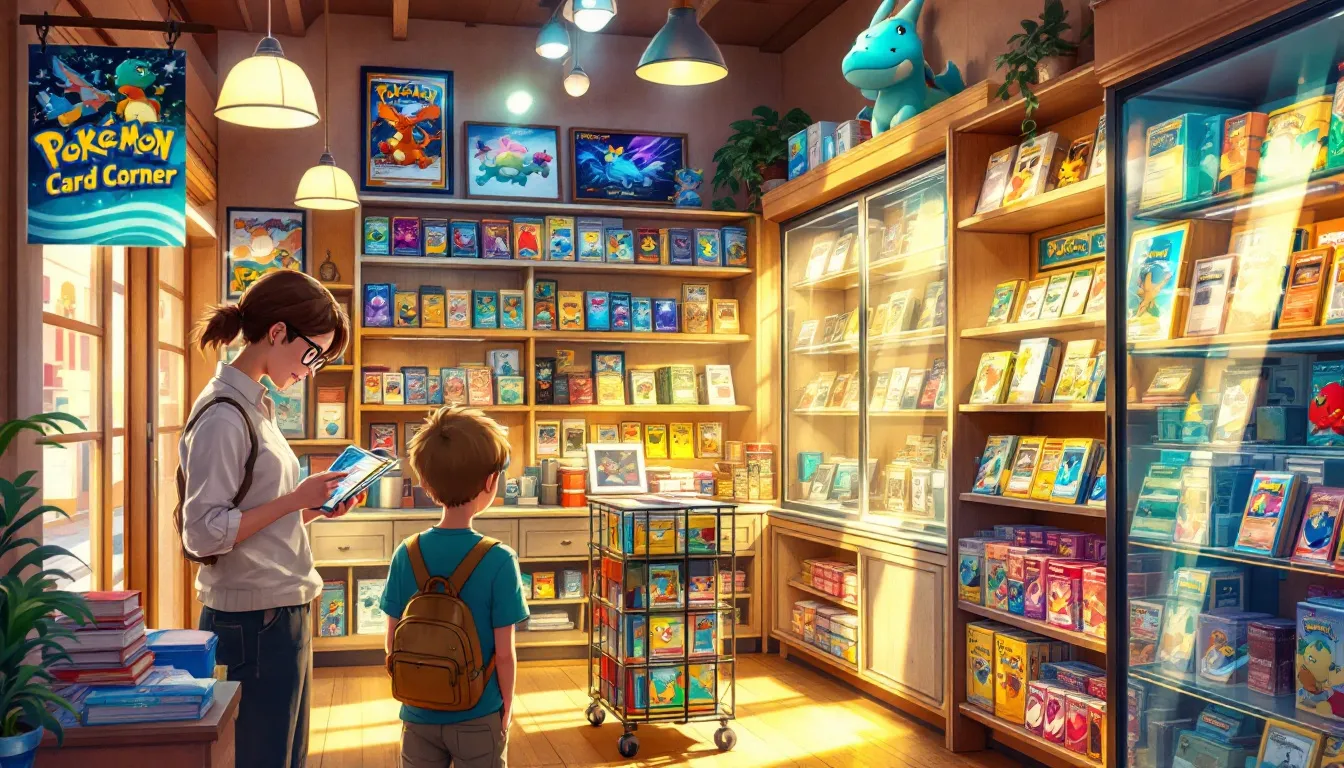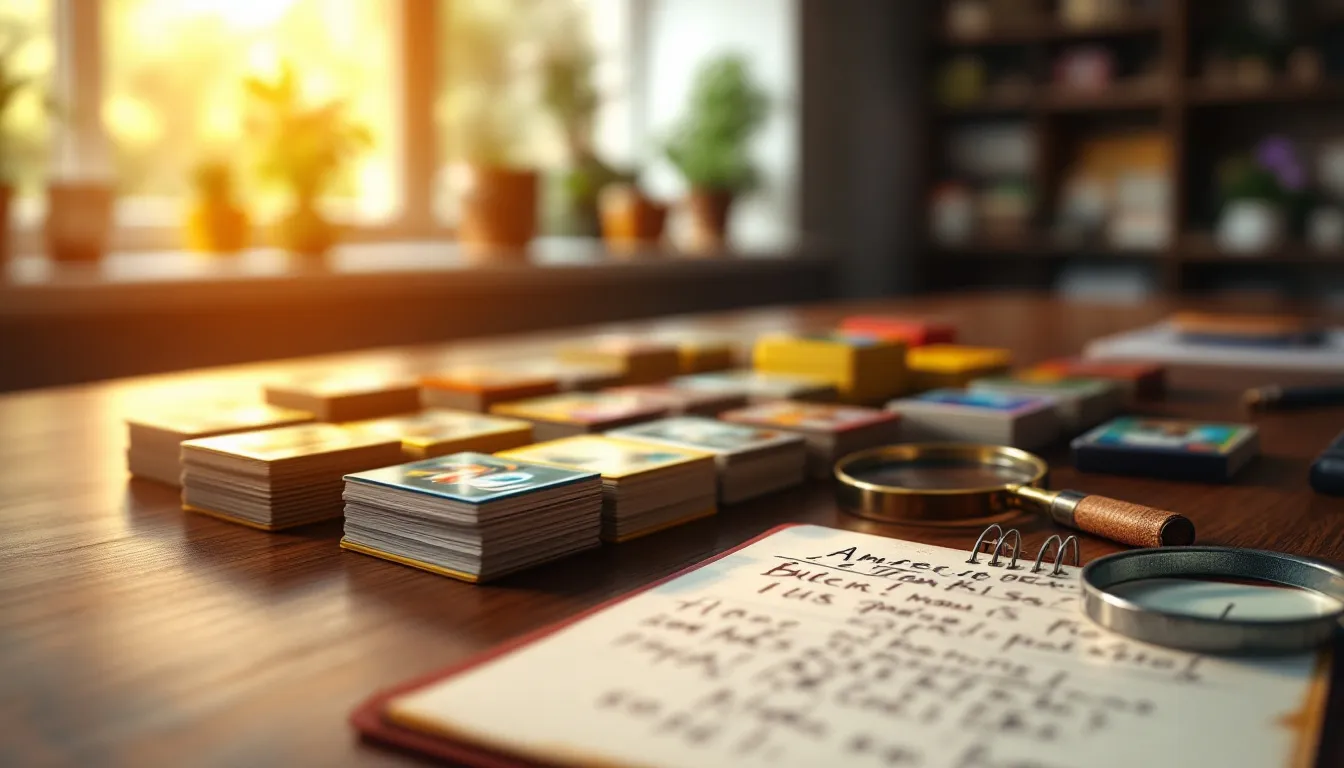Want to score great deals at card shows? Here's how to negotiate like a pro:
- Check prices beforehand
- Start with friendly conversation
- Make smart offers (start fair, try bundles)
- Handle counter-offers well
- Know when to walk away
Key takeaway: Do your homework, be friendly but firm, and don't be afraid to pass on bad deals.
Card shows are a goldmine for collectors, but you need solid negotiation skills to really win. Here's a quick guide to crushing it at your next show:
- Research prices using eBay sold listings and apps like Ludex
- Build rapport with sellers before talking money
- Make fair offers, consider bulk buys for discounts
- Be ready to compromise, but know your limits
- Walk away from bad deals - there's always another table
Remember: Cash is king, bundle deals rock, and patience pays off. Happy hunting!
Related video from YouTube
Check Card Prices Before You Buy
Let's talk about a key step in your card show strategy: knowing your prices. This can make or break your deals.
Look Up Current Market Prices
Do your homework before the show. Here's how:
Check eBay's Completed Listings. It shows what people are actually paying. Search for your specific card details, then use the "sold listings" filter. You'll see price patterns emerge.
Download the Ludex app. Snap a pic of a card for instant values based on recent sales across marketplaces. It's like a pocket price guide.
Check Card Condition
A card's condition can dramatically affect its price. At shows, you'll see everything from pristine to well-loved.
When checking a card, look for:
- Centering
- Corner sharpness
- Edge wear
- Surface scratches or print defects
A top-condition card can be worth way more than its worn counterpart. The Ludex app can give you a rough estimate based on condition.
Compare Online vs. Show Prices
Card show prices often differ from online listings. They might be higher, but you can also find great deals.
Use the CollX app to scan cards on the spot. It taps into a huge database and gives you the median value from recent sales. This info is your ace for negotiations.
Use Price Guides and Sales Data
Don't just rely on apps. Dig into some solid data:
This tool tracks collection value and provides detailed sales charts. Try it free for a week with the code 7FREE.
This massive database covers millions of cards across sports and Marvel. It's full of sales charts and current listings.
3. Terapeak
For rare cards with no recent sales, Terapeak on eBay offers historical data to work with.
With this info, you'll walk into that card show ready to spot the deals and dodge the duds. You'll know when to pounce on a bargain or walk away from an overpriced "gem."
Start With a Good Conversation
At card shows, negotiation starts before you even mention prices. Building rapport with sellers can lead to smoother deals and better prices. Here's how to kick things off right:
Break the Ice
Keep it simple. A friendly "Hello" and a smile go a long way. Make eye contact and introduce yourself. Try something like, "Hi there! I'm Alex. You've got a great selection here." This sets a positive tone from the start.
Show Real Interest
Don't fake it - actually engage with the seller's collection. Ask good questions about cards that catch your eye. For example:
"That 1986 Fleer Michael Jordan rookie looks mint. How long have you had it?"
This shows you know your stuff and you're genuinely interested, not just hunting for a bargain.
Present Yourself as a Serious Buyer
Show you're not just browsing. Mention specific cards or sets you want. Talk a bit about your collection or recent buys. This tells the seller you're a serious collector who gets the market.
You might say: "I've been working on my 1990s NBA sets lately. Your Topps Chrome cards are exactly what I've been looking for."
Pick the Right Time to Talk Price
Timing matters. Let the conversation flow before jumping into prices. Chat for at least 5-10 minutes before bringing up costs. This gives you time to connect and get a feel for the seller.
"Building rapport can set the stage for a positive negotiation." - The Shoppe Sports Cards Team
The goal? Create a friendly vibe that makes negotiation feel natural, not like a battle.
Make Smart Offers
You've built rapport with the seller. Now it's time to make your move. Let's look at some strategies that work for both buyers and sellers.
Start With Fair Prices
The key to successful negotiation? Start with a fair offer. The Shoppe Sports Cards puts it well:
"Begin the negotiation process with a fair and reasonable offer. This shows respect for the seller and lays the foundation for a constructive dialogue."
Here's how to make that first offer count:
- Use your price research to inform your offer
- Start slightly below market value
- Explain your offer if it's lower than asking price
Your goal? Keep the conversation going, not shut it down with a lowball offer.
Buy Multiple Cards at Once
Want better deals? Think bulk. Sellers often cut prices when you're taking multiple cards. Why? It works for them too:
- They move more inventory at once
- It means less work per sale
- A bigger sale can make them more flexible on price
Try this: "I like these three rookie cards. If I take all of them, what's your best price?"
Set Bundle Prices
Take the multiple card strategy further with bundle pricing:
1. Group similar cards (same set, player, or era)
2. Suggest a package deal price
3. Be ready to adjust the bundle
For example: "That's a nice 1986 Fleer Basketball set. Instead of picking a few, what if I took the whole set? What kind of deal could we do?"
Cash vs. Card Payment
Your payment method can affect your negotiating power:
Cash:
- Seller gets paid right away
- No fees for the seller
- But you need to carry it safely
Credit Card:
- Convenient and offers purchase protection
- You might get rewards points
- But there are fees for the seller
UCCU notes:
"Credit cards offer convenience since you don't have to carry around large amounts of cash."
But at card shows, cash is often preferred. Many sellers like it and might offer better deals for cash.
Pro tip: If you're using a credit card, mention it early. Some sellers might factor in the fees when quoting prices.
sbb-itb-0db97a5
Handle Counter-Offers Well
Negotiating at card shows can be tricky. Sellers often push back on initial offers, so you need to know how to handle counter-offers. Here's how to keep the deal alive when things get tough.
Deal With Price Pushback
When a seller doesn't accept your first offer, don't sweat it. It's part of the game. Here's what to do:
- Listen closely to their reasons
- Remind them why your offer is fair
- Ask questions to understand their position
Shaq Card Collector DE, a pro negotiator, says:
"Your initial offer should be lower than what you're willing to pay. Expect the seller to counter it."
This gives you room to negotiate without breaking the bank.
Try Different Deal Approaches
If Plan A fails, get creative:
- Suggest bundle deals
- Offer trades plus cash
- Ask for extras with high-end purchases
The key? Be flexible. You might find a win-win deal by exploring different options.
Know Dealer Costs
Understanding a dealer's expenses can give you an edge. Keep in mind:
- Dealers often buy in bulk at lower prices
- Grading costs for slabbed cards
- Show expenses like booth rentals and travel
This info helps you make offers dealers are more likely to accept. They might be more flexible on older stock than new arrivals.
Meet in the Middle
Sometimes, the best deal is a compromise. Here's how to find it:
1. Decide your max price before negotiating
2. Counter with a number between your initial offer and their asking price
3. Use specific figures like "$127" instead of "$130"
The Shoppe Sports Cards team notes:
"Negotiations can take time, especially at busy card shows. Be patient and ready to put in some effort to get the cards you want."
If you can't agree, it's fine to walk away. There's always another deal waiting. Remember, a good negotiation leaves both sides happy, not feeling cheated.
Know When to Stop
Negotiating at card shows can be a rush, but knowing when to walk away is key. Here's how to spot bad deals and exit smoothly.
Spot Bad Deals
Not every negotiation ends in a win. Watch out for these red flags:
- Seller won't budge on a crazy price
- You're feeling pushed or uneasy
- Card condition doesn't match the price tag
- Deal seems too sweet (it probably is)
It's fine to pass. Your wallet will thank you.
Stay Professional
Ending talks doesn't mean burning bridges. Keep it cool:
- Thank the seller
- Explain your stance calmly
- Leave the door open
"Being a responsible, friendly buyer can go a long way." - SI Collects
This approach keeps things positive, even when deals fall through.
Find Other Ways to Buy
Negotiation flopped? No sweat. You've got options:
- Hit up value boxes at the show
- Look for bundle deals
- Browse online after the show
Pro tip: Some sellers might bend at the end of the show. Circle back if you're still around.
Look for Other Sellers
Card shows are packed with options. If one deal tanks, another might be waiting:
- Scan for similar cards
- Ask fellow collectors for tips
- Check the show map for specialists
Patience pays off. The perfect deal might be just a few tables away.
Knowing when to walk is a superpower in card collecting. It saves cash, time, and headaches. Plus, it keeps the hobby fun. So next time you're at a show, remember: it's cool to say "nope" and move on to the next find.
Conclusion
You've got the inside scoop on card show negotiations. Let's recap the key strategies and look at how to keep improving.
Main Points Review
We've covered five essential tips for successful card show negotiations:
- Do Your Homework: Research prices and conditions before the show. Use eBay's Completed Listings, the Ludex app, and Market Movers to stay informed.
- Build Rapport: Start with a friendly chat. Show interest in the seller's collection before talking prices.
- Make Smart Offers: Begin with fair, informed offers. Consider bulk buys for better deals, and be ready to negotiate bundle prices.
- Handle Counter-Offers: Be ready for pushback. Stay flexible, understand dealer costs, and be willing to compromise when it makes sense.
- Know When to Walk: Spot bad deals and exit gracefully. Remember, there are always other opportunities at the show or online.
Keep Practicing
Becoming a skilled negotiator takes practice. Here's how to keep improving:
Attend more shows. Each event is a chance to refine your skills. The more you negotiate, the better you'll get.
Track your deals. Keep a log of your purchases, including initial asking prices and final deals. This helps you spot trends and improve your strategies.
Network with other collectors. Join online forums or local groups. Sharing experiences can give you new insights and tactics.
Stay updated on market trends. The card market is always changing. Regularly check resources like Sports Card Investor Guide to stay on top of shifting values.
Reflect after each show. Take time to review what worked and what didn't. Be honest about where you can improve.
"Keep practicing your negotiation skills at future shows", says Nate Murphy, a sports card expert. Each interaction is a learning opportunity.
FAQs
How to negotiate trading cards?
Negotiating trading cards at shows is part art, part science. Here's how to do it right:
Be polite. Sounds simple, but you'd be surprised how many people forget this basic rule.
Know the seller's side. They've got costs and need to make a profit. If they paid $50 for a card, they'll want at least $10 on top.
Start low, but not too low. Give yourself room to go up without insulting the seller.
Cash is king. Many dealers prefer it, and it might get you a better deal.
Bundle up. Try something like: "What's your best price if I take these three rookie cards?"
Remember, good negotiation means both sides win. If you can't get a fair deal, be ready to walk away.
How to be successful at a card show?
Success at a card show isn't just about haggling. Here's how to crush it:
Have a game plan. Know what you want and how much you can spend before you go.
Look for raw cards. Ungraded cards can be hidden gems at great prices.
Don't ignore value boxes. These big boxes of cheaper cards can hide some real treasures.
Use your phone. Look up card values on the spot to make smart decisions.
Buy off-season. Some sports cards are cheaper when that sport isn't playing.
Bring trade bait. Having cards to trade can give you an edge in negotiations.
Network. As credit card expert Peter Rothbart says, "The more pleasant you are to work with, the more deals you'll get done."
Be patient. Sometimes the best deals come at the end of the show when dealers are ready to pack up.


